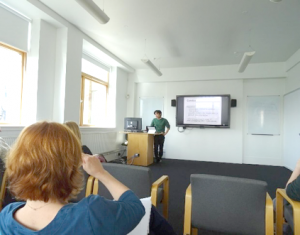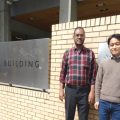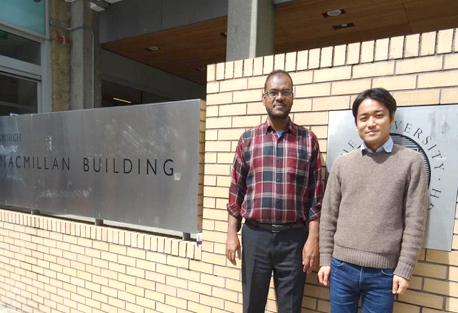
Scotland Report
Preliminary study for a new collaborative research
Key Words:Language Socialization, Academic Meeting, Interdisciplinary Thinking, Networking
Koji Sonoda
9 February 2017 – 13 July 2017
Centre of African Studies, the University of Edinburgh (Scotland)
- Research Project
This study focuses on language socialization among Baka hunter-gatherers in eastern Cameroon. Language socialization is a subfield of linguistic anthropology that provides empirical understanding of the socialization process by focusing on language usage in a community. Studies of African hunter-gatherer children have argued that relationships between children and adults are of an easygoing nature. The aim of this study is to show how this relationship is closely related with the tropical rainforest environment in which they live with respect to their perspective of everyday life.
- Details of My Stay
During my stay at the Centre of African Studies, I was able to interact with people both within and outside the university, such as researchers of African studies, sociolinguists, and anthropologists in the UK. The purpose of my stay in Scotland was to start networking and conduct substantial discussions about the international symposium scheduled to be held in December 2017. The university provided me with a desk in a building of the School of Social and Political Science (Photo 1). Many researchers gathered in this room, ranging from researchers belonging to the university to visiting researchers from many countries so that this room functioned like a revolving door. It is where I encountered Dr. Tuhinul Islam Khalil, a senior research fellow in Social Work from the University of Edinburgh who has worked on residential childcare in Bangladesh (Photo 2). His recent book addresses the issues faced by residential child and youth care throughout the world, including African countries. My intention was not to limit my session to the discussion of only African children, but rather to design it within the larger context of the social world of children. We had an active exchange of opinions on our approaches each other, and I asked him to take part in my symposium session as a discussant. In this way, I performed as an organizer of the session.
Furthermore, I collected information on academic meetings in the UK regarding African studies. In the UK, including the annual conference of the Centre of African Studies at the University of Edinburgh, there were various academic meetings on African studies, such as those conducted by the African Studies Association United Kingdom (ASAUK), the Royal African Society (RAS), Africa Together, and the Language in Africa Special Interest Group (LiASIG) etc. In addition, a variety of academic events organized by staff from the Centre of African Studies in Edinburgh were held during my stay. Through participation in some of these meetings and events, I realized that the UK is an indispensable country for African studies. Other than such academic meetings, some events on African cultures and societies took place in Edinburgh as well. One of the events I visited was called “Afropolitan,” which is a gallery exhibition managed by African members of the University of Edinburgh and the wider community. I was able to learn about the viewpoint of people of African descent living in Scotland, for instance, how these people are capturing their own identity, what the representation of Africa in Scotland is etc. Most of the information on academic meetings and events were provided by a subject academic support officer from the Centre of African Studies.
On the corner of the fourth floor of the library, a number of materials about African studies, including journals, has been accumulated and classified by African country, from where I collected documentary materials on education systems in Africa including those published by the Centre of African Studies. This was done to clearly specify priority issues that needed to be tackled in my session. Furthermore, I gathered materials on some works by Erving Goffman, a distinguished sociologist of interaction studies, and those by sociologists and anthropologists who have worked on his theoretical frameworks.
- Impressive Experiences
The Centre of African Studies conducts a seminar each Wednesday. During my stay, from February to March, a variety of guest speakers were invited every week from European or African countries. I tried not to miss these seminars. Although I was not very familiar with the situation of institutions like the Centre of African Studies in European countries, it seemed that the Centre of African Studies in Edinburgh played a crucial role in developing African studies in Europe, because it offered us space and time to interact with people who came from other universities and countries. Instead of this seminar, I was given time to discuss my work during a lunch meeting (Photo 3). Since the Centre of African Studies is a department of the School of Social and Political Science, I expected that I would receive many questions that would focus on public policy and politics, which I did not know much about. However, it exceeded my expectations and I received questions from various perspectives. I learned so much and realized that, to some extent, we had a “shared context” with which to discuss issues in an African community. It seems quite important to get this sense for further development in interactions with people from all over the world.
- Achievement and Reflection
The term ”Interdisciplinary Thinking” is heard everywhere in any academic meeting and conference; however, I found it difficult to put into practice. Interacting with researchers from a variety of fields, I was able to clarify my major concerns about my own studies (e.g., sociolinguistic and cognitive scientific concern). On the other hand, I fell into a situation where I was unsure of who to collaborate with because my subject matter allows me to explore in more detail from different points of view and fields, such as child development, the linguistic characteristics of a local language, a description of a learning environment, child support in social work, human evolution, learning, etc. Essentially, I was caught in “something like interdisciplinary thinking,” and finally became confused. I certainly found myself able to find commonalities with researchers from various fields, but it was not easy to jointly write a paper with them. Based on this experience, I finally realized that interdisciplinary thinking is useful when I feel that my studies are at a deadlock and I need to change the direction of my thinking. In addition, the book History and Theory in Anthropology by Alan Barnard, a professor emeritus of Social Anthropology at the University of Edinburgh, provided an alternative way for me to break free from the confusion in my mind. It describes the historical background of the origin of anthropology. This book greatly helped me organize my thoughts. What I learned from this experience was how important it is to have well-balanced thinking which, in turn, leads to successful interdisciplinary thinking.
- Future Work
I could achieve my goals of interacting with many people from various fields, however I strongly felt the need to do further networking and to share information. As I noted before, the University of Edinburgh plays a vital role as a place where researchers from around the world can gather. The people I got to know in Edinburgh and, more widely, in the UK during this time, were all from different countries, and I was able to share issues that are happening in the world with them which is possibly why I feel that networking is necessary. However, there is no need to rush into networking, as it needs to be done slowly as my studies improve. There would be another opportunity to form new ties with people who I have never met, but I realized that I should value the connections that arise naturally.
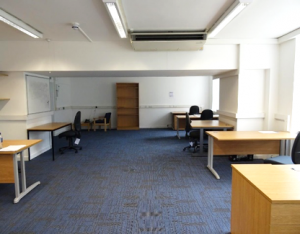 Photo 1. My office
Photo 1. My office
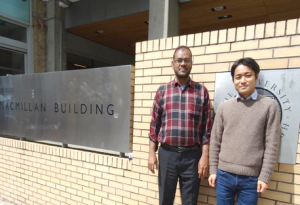 Photo 2. Dr. Tuhinul Islam Khalil
Photo 2. Dr. Tuhinul Islam Khalil

